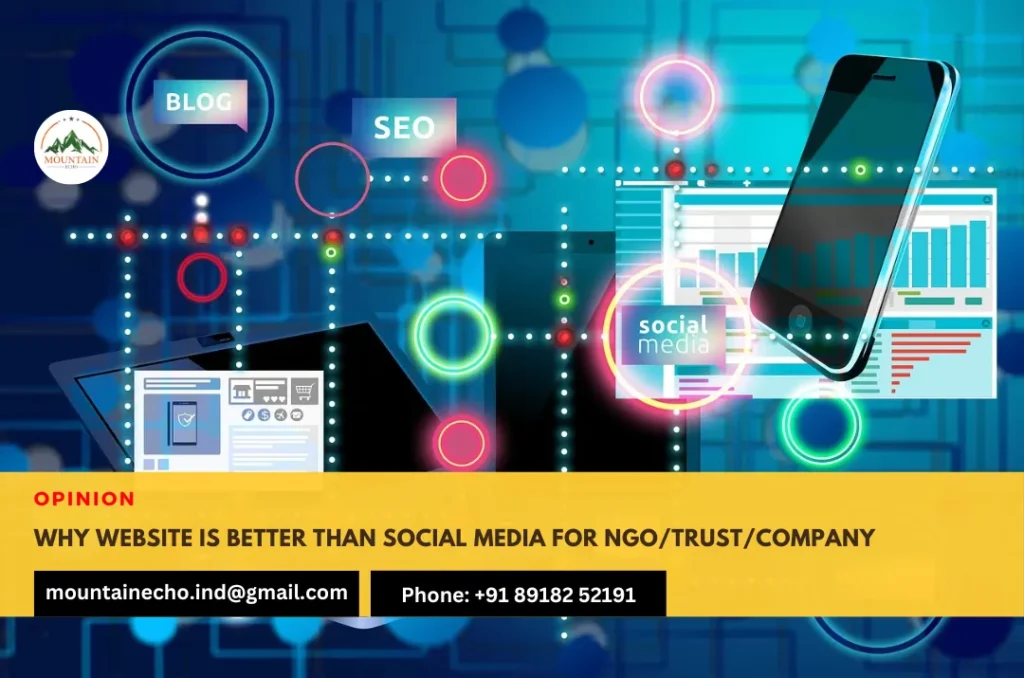Why website is better than social media for NGO/Trust/Company
WhatsApp Channel
Join Now
In today’s digital age, having an online presence is essential for every business and individual. But when it comes to establishing presence of NGO/Trust/Company, the question arises: should you own your website or simply leverage social media platforms?
Both options have their pros and cons, and the best choice ultimately depends on your specific needs and goals. Each platform comes with its unique set of advantages and challenges, making the decision a nuanced one.
Some of the points that we need to consider while choosing the correct platforms for NGO/Trust/Company include:
- The ability to generate potential leads
- Better return of investment
- The help provided to make a sustainable growth
- The value added to enhance your presence
Website is your own property while social media is a rented property.
Your website is your own digital turf. You have complete control over the content, design, and functionality.
Social Media accounts like Facebook, Instagram, X etc are owned by someone else. It is very likely that your account could be shut down, blocked, or censored without any intimation.
Website is for legitimacy and authority while social media is for engagement and entertainment.
A website adds legitimacy and establishes your NGO/Trust/Company as a trusted authority in your field making your content evergreen and accessible as long as you maintain it.
Social media thrive on people’s engagement, compelling platforms to constantly change algorithms in order to prioritize fresh content. As a result, many posts of your NGO/Trust/Company could eventually fade into obscurity over time.
Website helps you brand yourself while social media helps you draw traffic
A well-designed website serves as a powerful tool to present your NGO/Trust/Company vision, expertise, accomplishments, and showcase your professional brand.
A website offers a curated space that reflects your identity, expertise, and unique qualities, allowing you to control the narrative surrounding your NGO/Trust/Company.
Social media platforms play the role of driving traffic to your website and expanding your online presence. Using various social media channels, you can engage with a broader audience, share your content, and have a direct personal interaction with your supporters and followers enabling you to draw attention to your website and reach new audiences.
SEO enables discoverability of a website while trends or engagement enables social media reach
Search Engine Optimization (SEO) is the backbone of online visibility. A well-optimized website is more likely to rank higher in search engine results, increasing its discoverability among potential visitors.
In contrast, social media algorithms determine the visibility of your content based on various factors, often beyond your control. While trending topics and engagement play a role, the algorithmic nature can limit your content’s reach.
Website offers various revenue streams while social media offer limited revenue options
Having a website enables you to set up various ways for monetization. From e-commerce sales to affiliate marketing and sponsored content, the potential for generating revenue is many.
But social media platforms offer very limited monetization options. Advertising and posting sponsored content may help you earn some but that does not provide the same level of control and profitability as owning a website.
Websites are more flexible and adaptable as compared to social media
Websites can easily adapt to evolving trends and technologies. Be it going with the latest design trends or integrating new features, a website provides flexibility to stay updated.
Adapting to trends on social media could be very much dependent on the platform’s guidelines and policies. What’s popular today may not align with the platform’s guidelines tomorrow, limiting your ability to stay ahead of the curve.
Analytics and data of a website are yours, while they are not for social media
Website owners have access to comprehensive analytics tools that offer insights into visitor behavior, popular content, and more. This data is invaluable for refining strategies and optimizing content.
On social media, user data is owned and controlled by the platform. This lack of ownership raises privacy concerns and limits your ability to leverage data for personalized marketing and content strategies.
Telegram Channel
Join Now



